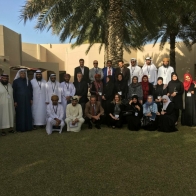Dozens of graduates from 12 Middle Eastern and North African countries have begun 9 months of study designed to bolster their countries’ capacities to redesign curricula for 21st Century learning.
The IBE-led initiative offers a Postgraduate Diploma in Curriculum Design and Development (PGDDD) to graduates in Arabic-speaking states. It was launched in 2016 in partnership between the IBE, the Hamdan Bin Mohammed Smart University (HBMSU) in the United Arab Emirates and UNESCO’s Section on Teacher Development. It’s supported by the Hamdan Bin Rashid Al-Maktoum Foundation.
The diploma programme began on January 14 with 10 days of face-to-face studies at Hamdan Bin Mohammed Smart University (HBMSU) in Dubai. It is followed by a further 9 months of on-line learning sessions and support for students with tutors.
The 38 participants (see photo) are the second cohort from the Arabic-speaking countries benefitting from a specialized course to support the region’s increasingly significant process of rethinking curricula. Many countries are rethinking their approach so learners are more adaptable to the needs of rapidly changing economies. This year's participants come from Algeria, Egypt, Jordan, Iraq, Lebanon, Morocco, Oman, Palestine, UAE, Sudan, Syria and Yemen.
Experts lead the programme
Experts from around the world are delivering the training, including Renato Opertti, Senior Programme Specialist at the IBE. Mr. Opertti coordinates IBE’s programme for Innovation and Leadership in Curriculum, Learning and Assessment.
Mr. Opertti explained: “The course is a great opportunity for those with an interest in this field to gain from the experience of those who lead curriculum development and design, a process that will improve the capacities of millions of learners in the future.”
One of last year’s graduates commented: "Gathering educators from all over the Arab States to facilitate IBE’s PGDDD was outstanding. Colleagues’ comments on various issues and what they share or deem important and then mention to the group are fascinating."
Diploma programme details
The diploma’s face-to-face sessions feature workshops, roundtable discussions, school visits and conferences animated by distinguished international and national experts. The on-line learning sessions will strengthen participants’ capacities to develop and implement quality curricula for all, within a comparative international perspective.
The programme covers the Middle East, North Africa, Arabic-speaking countries and some African countries, such as Mauritania, that use Arabic as their official language. The programme is open to all graduates in education or those with experience in education-related fields, such as policy-making, curriculum development, teaching, school management and research. The learning model is based on three interdependent processes: Awareness (self-learning), Application (face-to-face, hands on knowledge) and Advisory (virtual follow-up).
Background to diploma development
The IBE introduced the Postgraduate Diploma in Curriculum Design and Development in 2010 within the framework of UNESCO’s global capacity development programme that promotes quality in education. The diploma is now operational thanks to UNESCO’s partnership with national institutions and education donor partners.
The qualification is rooted in UNESCO’s view that education is key to sustainable and fair social and economic development. The countries participating in this programme are all in the process of implementing curriculum and teacher policy reforms.
UNESCO believes that curriculum and teachers are at the heart of education and reforms to achieve SDG 4 and Education Agenda 2030. In addition, this will contribute towards the achievement of sustainable and inclusive societies that value knowledge, human rights, and a culture of peace in diversity.
More information
For more information about the Diploma programme, please refer to the
Flyers (in English, French & Arabic) and visit the
webpage of HBMSU.
For any further questions, please contact:
Ms. Nadia AlShaya (
N.AlShaya@hbmsu.ac.ae) Manager, Learners Accessibility at HBMS
Mr. Renato Opertti (
r.opertti@unesco.org) Senior Programme Specialist at International Bureau of Education (IBE-UNESCO)
Lili Ji (
l.ji@unesco.org) Assistant Programme Specialist at International Bureau of Education (IBE-UNESCO)
